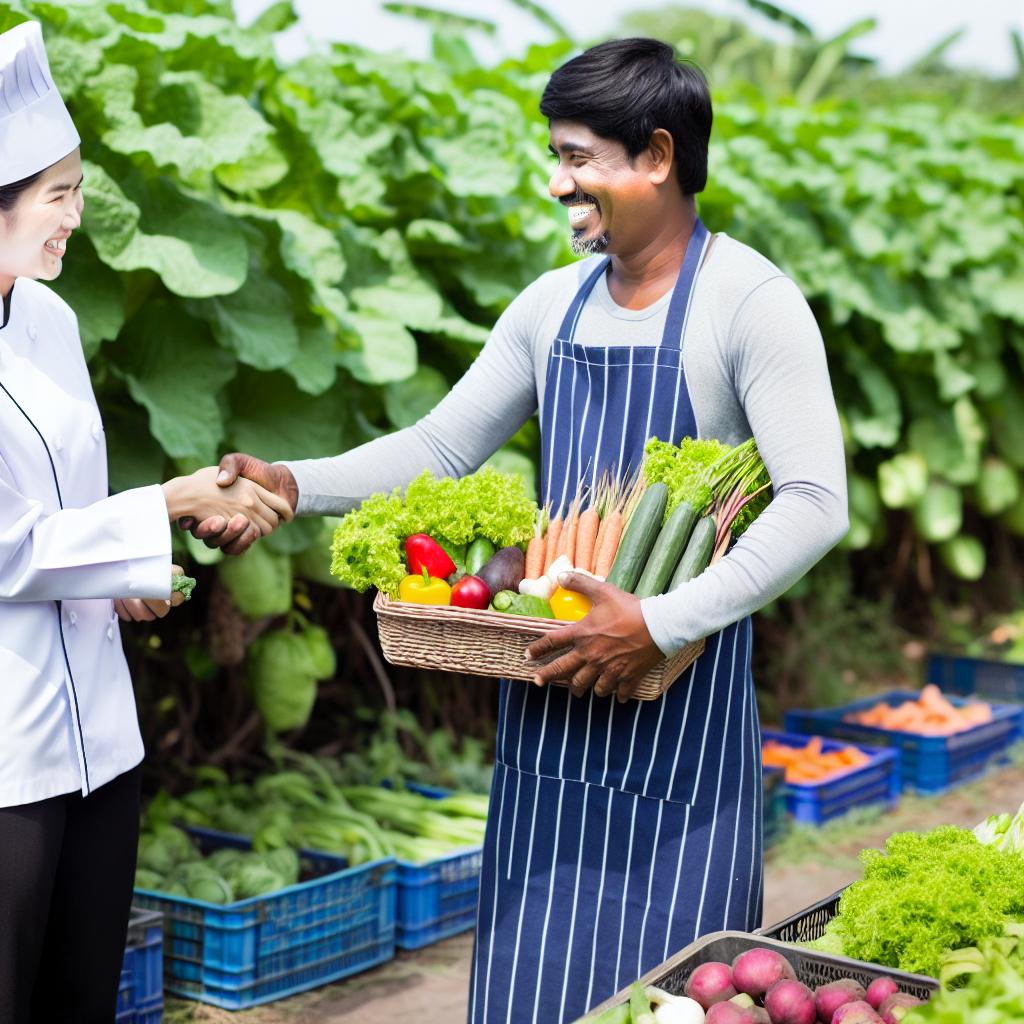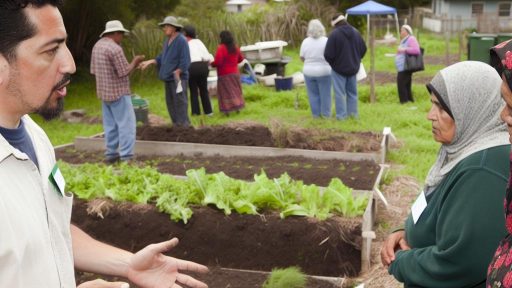Introduction to Direct Partnerships Between Farmers and Chefs
Direct partnerships between farmers and chefs foster fresh produce access.
This collaboration encourages a farm-to-table approach in dining.
Furthermore, it enhances the quality and flavor of dishes.
Chefs gain valuable insights about local ingredients.
Farmers benefit from direct feedback on their produce.
Benefits of Farmer-Chef Partnerships
These partnerships create a mutually beneficial relationship.
Farmers receive a guaranteed market for their products.
Chefs enjoy fresher ingredients that enhance their culinary offerings.
Additionally, these relationships build trust within the community.
Encouraging Local Sourcing
Local sourcing reduces transportation costs for produce.
This practice supports regional economies and sustainability.
A closer connection to the source enhances menu creativity.
Chefs can create seasonal menus based on available harvests.
Building Stronger Community Ties
Partnerships promote awareness of local agriculture.
They enable chefs to share farmers’ stories with their patrons.
Transform Your Agribusiness
Unlock your farm's potential with expert advice tailored to your needs. Get actionable steps that drive real results.
Get StartedSuch narratives strengthen community bonds and loyalty.
Dining experiences become more meaningful and authentic.
Benefits of Direct Partnerships for Farmers and Chefs
Enhancing Freshness and Quality
Direct partnerships ensure that chefs receive the freshest produce possible.
This immediate access fosters high-quality dishes that highlight seasonal ingredients.
Moreover, chefs can communicate their specific needs to farmers directly.
This communication leads to better crop selection tailored to culinary demands.
Building Trust and Relationships
Partnering directly cultivates trust between chefs and farmers.
Farmers gain insights into market trends through constant feedback from chefs.
In turn, chefs understand the challenges farmers face in their operations.
This mutual understanding supports a sustainable and respectful working relationship.
Supporting Local Economies
Direct partnerships boost local agriculture and the economy.
Farmers retain more profits by selling directly to restaurants.
Chefs showcase local ingredients, which attracts customers who value community support.
Consequently, this arrangement strengthens the local food system.
Educational Opportunities
Partnerships offer educational experiences for both parties.
Farmers can share knowledge about growing methods and sustainability practices.
Conversely, chefs can educate farmers on culinary trends and preferences.
Such exchanges enrich the community’s understanding of food production and consumption.
Ways to Initiate and Establish Partnerships
Effective Communication Strategies
Start by identifying common goals between farmers and chefs.
Use clear and concise messaging to express your interests.
Engage in open dialogue to understand each other’s needs.
Host regular meetings to strengthen relationships.
Utilize social media platforms for ongoing communication.
Consider creating a shared online space for collaboration.
Showcase Your Farming Business
Publish your professional farming services profile on our blog for a one-time fee of $200 and reach a dedicated audience of farmers and agribusiness owners.
Publish Your ProfileBuilding Trust Through Transparency
Be honest about production capabilities and constraints.
Share information on sourcing and supply chain details.
Encourage feedback to foster mutual understanding.
Show consistency in your commitments and actions.
Address any concerns promptly to maintain trust.
Leveraging Local Events
Organize farm-to-table events to showcase local produce.
Encourage chefs to collaborate on seasonal menus using local ingredients.
Participate in community farmer’s markets to enhance visibility.
Share success stories to inspire others in the network.
Invite local media to cover events for wider reach.
Creating Value Through Partnerships
Support sustainable practices that benefit both parties.
Offer chefs unique produce that enhances their menus.
Encourage farmers to innovate based on chef feedback.
Develop signature dishes that highlight local flavors.
Explore co-branding opportunities for marketing advantages.
Uncover the Details: Farm-to-Restaurant Programs for Sustainable Seafood Providers
Case Studies of Successful Partnerships in the Industry
Farm-to-Table Partnership: Green Fields and Chef Maria
Green Fields Farm fosters a strong relationship with Chef Maria Jones.
They focus on seasonal produce for her renowned restaurant, Fresh Plates.
This partnership emphasizes organic vegetables grown right on the farm.
Chef Maria designs her menu based on available crops each week.
This dynamic ensures the freshest ingredients and showcases local offerings.
Customers enjoy unique dishes that reflect the local harvest.
Through collaboration, both parties increase their visibility and customer base.
Urban Farming Collaboration: City Roots and Chef Ryan
City Roots, an urban farm, teamed up with Chef Ryan Lee from Urban Dine.
This partnership highlights the importance of local sourcing in urban areas.
They provide a variety of herbs and edible flowers throughout the year.
Chef Ryan incorporates these crops into innovative, seasonal menus.
Furthermore, they offer farm tours and cooking classes to locals.
These activities educate the community on sustainable practices.
As a result, both entities mutually benefit from increased community engagement.
Local Orchard Partnership: Apple Hill and Chef Sarah
Apple Hill Orchard works closely with Chef Sarah Thompson from Farmhouse Bistro.
This collaboration focuses on apple varieties and seasonal events.
Chef Sarah creates special dishes inspired by the orchard’s offerings.
They also host an annual Apple Festival, drawing in large crowds.
This festival showcases local cuisine and promotes farm-fresh produce.
The partnership attracts visitors who appreciate farm-to-fork dining.
Consequently, both the orchard and restaurant see significant growth.
Community Supported Agriculture: Harvest Box and Chef Tony
Harvest Box participates in a unique arrangement with Chef Tony Garcia.
This relationship utilizes Community Supported Agriculture (CSA) models effectively.
Chef Tony receives a weekly box of fresh produce for his restaurant.
Showcase Your Farming Business
Publish your professional farming services profile on our blog for a one-time fee of $200 and reach a dedicated audience of farmers and agribusiness owners.
Publish Your ProfileHe utilizes this bounty in daily specials and signature dishes.
They engage customers by offering cooking demos featuring CSA items.
This initiative strengthens community ties and promotes local agriculture.
Both partners benefit from shared marketing efforts and community goodwill.
Learn More: Farm Fresh Delivery Services for Organic Food Lovers
Challenges Faced in Building Partnerships
Understanding Miscommunication
Miscommunication often arises between farmers and chefs.
Farmers may lack knowledge about culinary needs.
Conversely, chefs might not grasp farming limitations.
To overcome this, both sides can engage in open discussions.
Regular meetings can foster mutual understanding.
Navigating Logistical Issues
Logistics can complicate direct partnerships.
Farmers often face challenges with timely delivery.
Chefs may require consistent supply schedules.
Addressing this requires planning and coordination.
Utilizing technology can enhance communication.
Building Trust and Rapport
Trust issues may hinder partnerships.
Both parties need to foster reliability and transparency.
Attending each other’s operations creates familiarity.
Additionally, sharing success stories can build confidence.
Overcoming Financial Constraints
Financial barriers can deter collaboration.
Farmers might struggle with pricing for fresh produce.
Chefs may find it hard to afford local ingredients.
Discussing pricing strategies can benefit both parties.
Collaboration on community-supported agriculture programs may help.
Cultivating Community Engagement
Engaging the community benefits both farmers and chefs.
Hosting events can showcase local produce.
Collaboration in promotional activities fosters visibility.
It also strengthens community ties around local food movements.
Gain More Insights: Enhancing Nutrient Cycles Through Integrated Livestock And Permaculture Practices

The Role of Local Food Movements and Community Support in Fostering Relationships
Importance of Local Food Movements
Local food movements create vital links between farmers and chefs.
These movements encourage sourcing ingredients directly from regional growers.
By promoting local produce, chefs enhance their menus and support the local economy.
Moreover, they help reduce carbon footprints associated with transportation.
Community Engagement
Community support amplifies the benefits of these partnerships.
Local markets and food fairs provide platforms for direct interaction.
Farmers can showcase their fresh produce, while chefs can offer tastings.
Such engagements strengthen the connection between food producers and consumers.
Culinary Education and Networking
Culinary schools often engage with local farmers for educational purposes.
Students learn the value of fresh, seasonal ingredients firsthand.
Additionally, this interaction fosters networking opportunities for future collaborations.
Showcase Your Farming Business
Publish your professional farming services profile on our blog for a one-time fee of $200 and reach a dedicated audience of farmers and agribusiness owners.
Publish Your ProfileChefs can invite farmers to provide insights during culinary demonstrations.
Benefits of Direct Partnerships
Direct partnerships lead to fresher, tastier dishes served in restaurants.
Farmers experience fair prices for their products, boosting their livelihoods.
In turn, diners enjoy meals made from high-quality, locally-sourced ingredients.
Consequently, these relationships support both gastronomic excellence and economic sustainability.
Learn More: Food Traceability in Farming and Its Role in Consumer Trust
Impact of Direct Partnerships on Sustainability and Food Freshness
Enhancing Freshness Through Direct Sourcing
Direct partnerships allow chefs to source produce straight from farmers.
This practice ensures that the food served is fresh and seasonal.
Consequently, chefs can offer dishes that highlight the best flavors.
Additionally, shorter supply chains reduce the time from farm to table.
This results in vegetables and fruits that are at their peak freshness.
Promoting Sustainable Practices
Collaborative efforts between farmers and chefs promote sustainable farming methods.
For example, chefs can encourage farmers to grow organic produce.
This leads to healthier food options for consumers.
Moreover, sustainable practices reduce the environmental impact of agriculture.
Farmers often adopt innovative techniques to improve soil health and biodiversity.
Building Community Relationships
Direct partnerships foster strong relationships within local communities.
Chefs can advocate for farmers by showcasing their products on menus.
Such practices contribute to a thriving local economy.
Furthermore, these partnerships create a sense of trust among consumers.
People appreciate knowing where their food comes from and its journey.
Encouraging Education and Awareness
Farmers and chefs together can educate consumers about seasonal eating.
Workshops and events can help people understand the benefits of local produce.
Such initiatives raise awareness about food sourcing and sustainability.
As a result, consumers become more thoughtful about their food choices.
This collective effort drives a demand for fresh and local food options.
Tools and Platforms to Facilitate Farmer-Chef Collaborations
Online Marketplaces
Online marketplaces significantly enhance connections between farmers and chefs.
Platforms like LocalHarvest allow chefs to source fresh, local ingredients directly from farmers.
Additionally, farmers can list their products for easy visibility and selection.
Mobile Applications
Mobile applications streamline communication between farmers and chefs.
For instance, apps like Farmigo offer direct ordering systems.
These apps allow chefs to customize their orders based on seasonal availability.
Networking Events
Networking events foster strong relationships within the food community.
Farm-to-table events connect chefs with local producers directly.
Moreover, these events encourage collaborative discussions about fresh produce.
Community Supported Agriculture (CSA) Programs
CSAs create direct relationships between consumers, farmers, and chefs.
Through these programs, chefs can purchase a share of a farmer’s harvest.
This ensures chefs receive fresh produce while supporting local agriculture.
Social Media Engagement
Social media platforms enable chefs and farmers to communicate and promote their brands.
Instagram and Facebook are popular for showcasing seasonal dishes and farm products.
Showcase Your Farming Business
Publish your professional farming services profile on our blog for a one-time fee of $200 and reach a dedicated audience of farmers and agribusiness owners.
Publish Your ProfileEngaging content helps build a loyal following and encourages direct sales.
Workshops and Collaborations
Workshops provide learning opportunities for both chefs and farmers.
These collaborations can cover topics such as sustainable farming practices and cooking techniques.
Through shared knowledge, both parties can improve their operations and offerings.
Additional Resources
Farm to Table: Building Local and Regional Food Systems – SARE
Supporting Local Farmers: The Importance of Buying Locally Grown …




